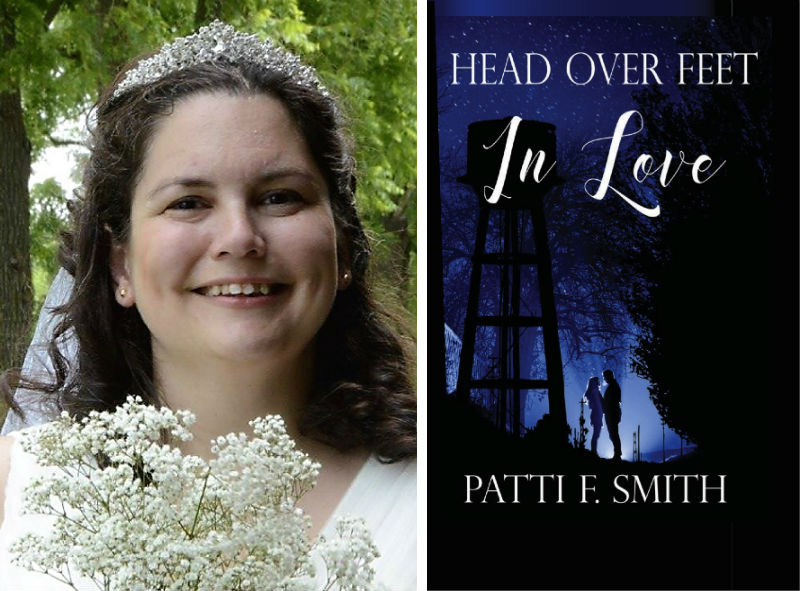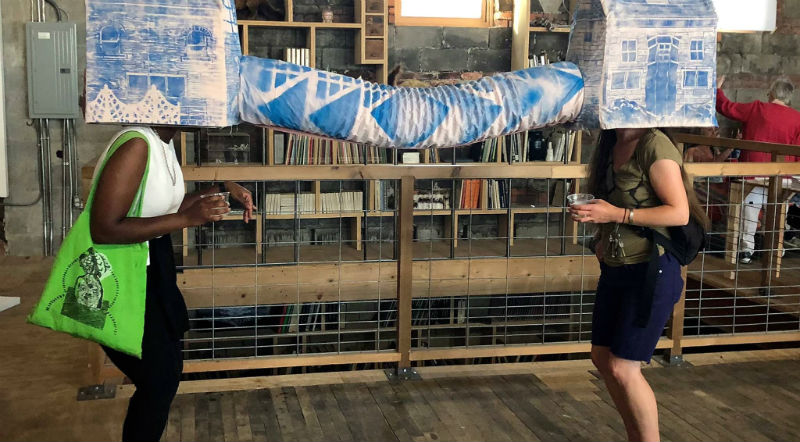An excerpt from "Head Over Feet in Love," the first novel by Ann Arbor's Patti F. Smith

Patti F. Smith is the author of the history books "Images of America: Downtown Ann Arbor," "A People’s History of the People’s Food Co-op," and the forthcoming "Forgotten Ann Arbor" (spring 2019). (She's also a regular contributor to Pulp.) Her debut fiction novel, "Head Over Feet in Love," comes out as an ebook on November 14 and as a print edition in February 2019. Smith gives us some background on the book, followed by an excerpt from the novel.
The first draft featured protagonist Rebecca Slater as a famous author who got six-figure advances, whose book was being made into a movie, who employed several assistants to help her with fan mail. The second draft saw Becca as a famous author who got six-figure advances but no mention of movie deals or assistants. The third draft found Becca as an author with a cult following; she still made a living from it but no more talk of hefty advances or net worth. The fourth draft presented Becca as a teacher who wrote books on the side, making money but not enough to live on.
In the final version, Becca hasn’t even gotten published yet.
Many things changed in the years that I wrote and rewrote Head Over Feet in Love -- Becca and her friends went from flip phones to smartphones, DSL to wi-fi, having a million dollars in the bank to scraping by as a teacher. But through it all Becca lived with bipolar disorder and anxiety.
Just like me.
U-M’s "Passing Strange" follows a rocking journey of discovery

In the late 1970s, a young African-American with musical ambitions left his strict religious home in Los Angeles to set out on a journey to discover who he was, what he believed and where he belonged.
Years later, the rock songwriter and musician known as Stew turned his story of self-discovery into the unusual and critically acclaimed musical Passing Strange. The musical, with book and lyrics by Stew, and music by Stew and a former bandmate, Heidi Rodewald, received seven 2008 Tony Award nominations and Stew won the award for best book. Passing Strange also won the Drama Desk Award for outstanding musical.
His story resonated with those who lived during those years and it resonates still with young audiences, which makes it a perfect vehicle for young actors. The University of Michigan Department of Musical Theatre will present Passing Strange Nov. 15-18 at the Arthur Miller Theatre.
It’s the words that are scary in Brass Tack’s "Blithe Spirit"

Ghouls, goblins, zombies, and ghosts.
Ooooh scary
Well, not all ghosts are scary.
Take Noel Coward’s Blithe Spirit. The ghost is mischievous but also charming. What is scary is the sarcasm that the characters hurl back and forth at each other.
Brass Tacks Ensemble will present Coward’s humorous take on all things ghostly Nov. 2-4 and 9-11 under the direction of Aaron C. Wade.
“It’s a haunted tale with a little bit of comedy and it’s that time of the season for a ghost story,” said Wade. “It a fun challenge to do this sort of theater.”
The Danish String Quartet offers a striking scope of expressions amid longtime friendships

When violinists Frederik Øland, Rune Tonsgaard Sørensen, and violist Asbjørn Nørgaard were 11 and 12, they met at a summer music camp, never guessing they would grow up to be part of what The New York Times called “an exceptional quartet.”
“I grew up nearby, and I just signed up because it was a chance to play in a big symphony orchestra, something that I had never really tried," says Nørgaard, now of the Danish String Quartet, which performs at Rackham Auditorium on November 15. "And then I met Rune and Frederik. Honestly, the friendship was more founded on the soccer field than in rehearsal rooms. The vibe of Danish music summer camps is quite loose, more focusing on the love that an amateur can have for music than working hard to build a career in music. I think this priority of values has always been quite important to us, and we are at times still quite shocked when we encounter the steely ambition that also is a part of the classical music world.”
96th All Media Exhibition at the Ann Arbor Art Center

Sarah Rose Sharp is an accomplished artist in many areas: she writes about art and culture, lectures at a half dozen colleges and universities, shows her own work in places like New York, Seattle, and the Detroit Institute of Arts, and most recently she curated the 96th All Media Exhibition at the Ann Arbor Art Center.
“This was an open call, so artists submit their work and my job as the juror is to choose which work gets into the show,” Sharp explains. “We received around 700 submissions, which were then culled down to 45. … A very challenging undertaking!”
The One Pause Poetry Salon creates a "nexus between appreciation and creation"

When attending the One Pause Poetry Salon, it struck me that its atmosphere is hard to come by. Part discussion, part reading, and part classroom, people attend to experience a community around poetry and to have an outlet in which to read and converse about poetry, a space that motivates and inspires.
The events, which are weekly from 8-10 pm on Wednesdays through December at Argus Farm Stop on Liberty, start with a free write for 12 minutes because, according to Mike Zhai who runs the Salon, 10 minutes seems too short and 15, too long. While classical music swells and night surrounds the market’s greenhouse, attendees diligently compose lines in their notebooks. A time to read and respond to the results of that writing session follows. Each person has the option to share or not and to chime into the conversation or not. This environment brings low stakes and high returns for people at any point in their journey with poetry.
“It’s fine for people to come and share their own poems or read their favorite poetry by others or just come and listen,” said Zhai. “It’s pretty informal in that way. I want to create this nexus between appreciation and creation.”
Cultivating “Candide” at the University of Michigan

Some theaters revive Broadway hits. Others take chances on new plays that may or may not be successful. In 1973, an adventurous theater in New York did what no theater had ever done: the Chelsea Theater Center of Brooklyn revived a 1957 Broadway flop.
Candide, for all its problems, featured music by Leonard Bernstein that rivals what he accomplished in West Side Story and his best concert works. After bringing in new people to revise the book and lyrics and finding a radical new way to stage the work, the Chelsea brought Candide back to Broadway; there, it drew huge audiences, earned rave reviews, and took five Tony Awards. Since then, Candide has been a staple of theater and opera companies -- it lives on the line between musical theater and operetta -- and has been revised by other companies along the way.
Now, on what would have been Bernstein’s 100th birthday, the University Opera Theatre, in collaboration with Michigan’s departments of Theatre & Drama and Musical Theatre, will present the 1988 Scottish Opera version. Matthew Ozawa will stage Bernstein’s favorite and final revision; Kenneth Kiesler will conduct the University Symphony Orchestra. “The Scottish version has much more music,” Ozawa reports.
Wooly Business: Stephany Wilkes tracks the fall and potential rise of the U.S. wool industry

When Stephany Wilkes became a knitter in 2007, she walked into a yarn shop and asked, “Where’s your local yarn section?” The shop attendant pointed her to a single brand of U.S.-made yarn. Nine years later, when I walked into a yarn shop for the first time, much had changed. I had several U.S.-made yarns to choose from -- even some Michigan-made yarns -- but found myself asking another question: “Why is this so expensive?”
The answer, as I later found, is that milling wool grown in the U.S. is so costly that most ranchers either send their wool overseas to be processed or use the fleeces as compost. Due to decades of adverse agricultural and trade policy, the cost of processing wool in the U.S. is very high. Wilkes' book, Raw Material: Working Wool in the West (Oregon State University Press, 2018), tells us how the bottom fell out of the U.S. wool industry and also shows us the way back to environmentally beneficial and economically profitable U.S. wool.
As for Wilkes, once she learned that a key factor in the high cost of U.S. wool is the lack of qualified shearers, she did the only logical thing: became a shearer herself. Raw Material is Wilkes' account of her unlikely career change from a software engineer at a San Francisco firm to a self-employed sheep shearer and wool classer. Along the way, she introduces us to many of the people who are working against the odds to bring U.S. wool back to life and make wool profitable for farmers and affordable for handcrafters.
I got the chance to talk to Wilkes in advance of her November 5 appearance at the Ann Arbor District Library.
Fifth Avenue Press launches its second round of books with a release reception

The Ann Arbor District Library's Fifth Avenue Press helps local authors produce a print-ready book at no cost -- from copyediting to cover design -- and the writers retain all rights. In return, the library gets to distribute ebooks to its patrons without paying royalties, but authors can sell their books -- print, digital, or audio -- however they choose and keep all the proceeds.
Started in 2017, Fifth Avenue launches its second round of books on Sunday, November 4, with a reception from 1-3 pm in the lobby of AADL's downtown branch, featuring author readings from the imprint's five new titles.
After "READ MORE," click the book titles to read interviews with creators of four of the five new books:
Ann Arbor Civic Theatre's "Arsenic and Old Lace" revels in horror and humor

Arsenic and Old Lace, Joseph Kesselring’s classic dark comedy now being staged by Ann Arbor Civic Theatre, provided director Alexandra Duncan with her first-ever stage role in high school -- though it wasn’t a particularly lively or demanding part.
“I was Adam Hoskins, the dead man in the window seat,” Duncan said.
Sound bizarre?
Welcome to the Brewster family home in Brooklyn, where writer Mortimer Brewster wants to marry the girl next door. Problem is, he’s just learned that his sweet old spinster aunts have been murdering lonely old men with poison-laced elderberry wine; plus, his delusional uncle, who believes he’s Theodore Roosevelt, has been providing graves by digging locks for the Panama Canal in the house’s cellar.


































